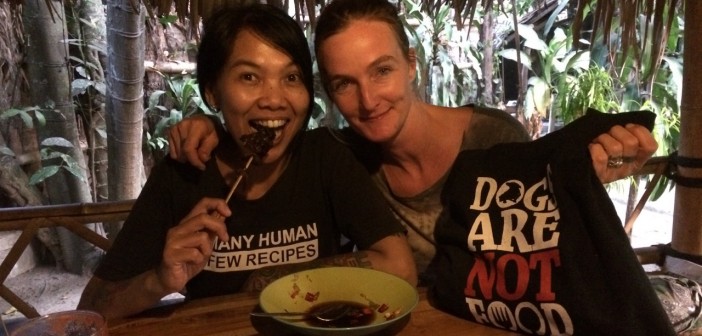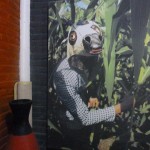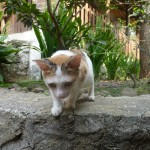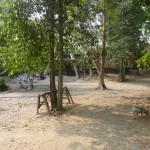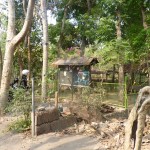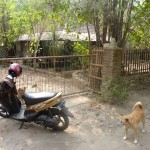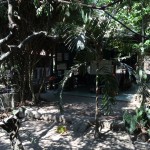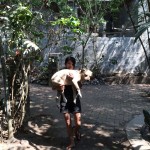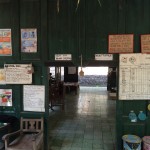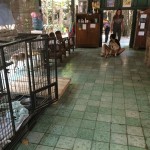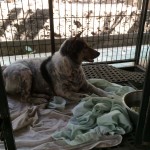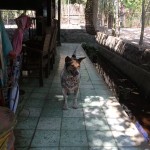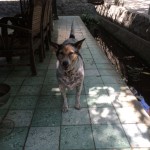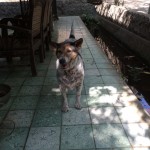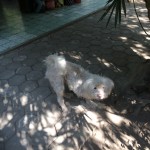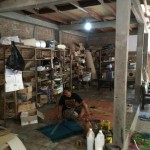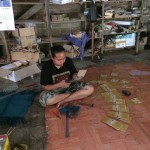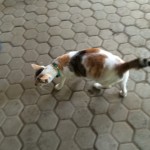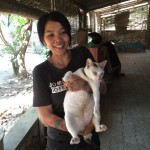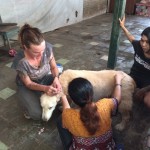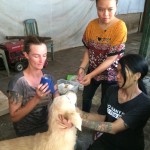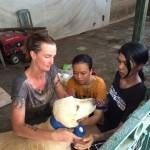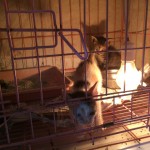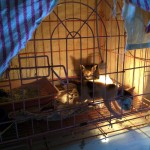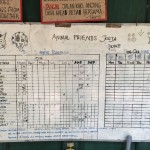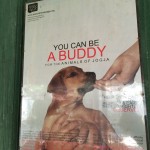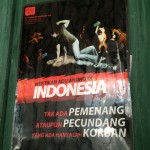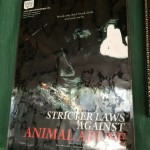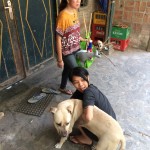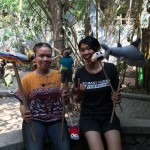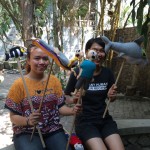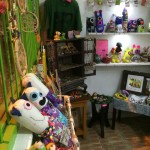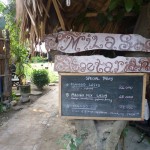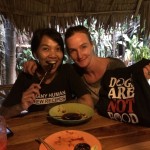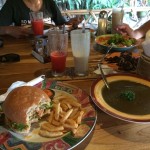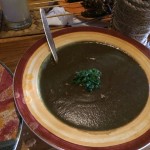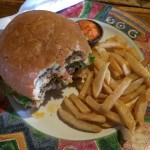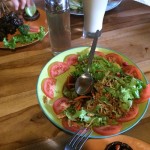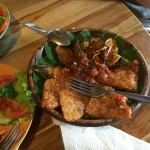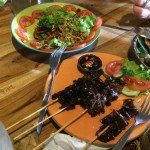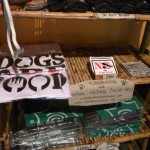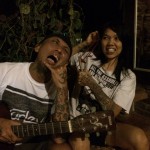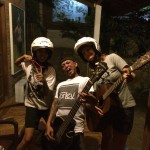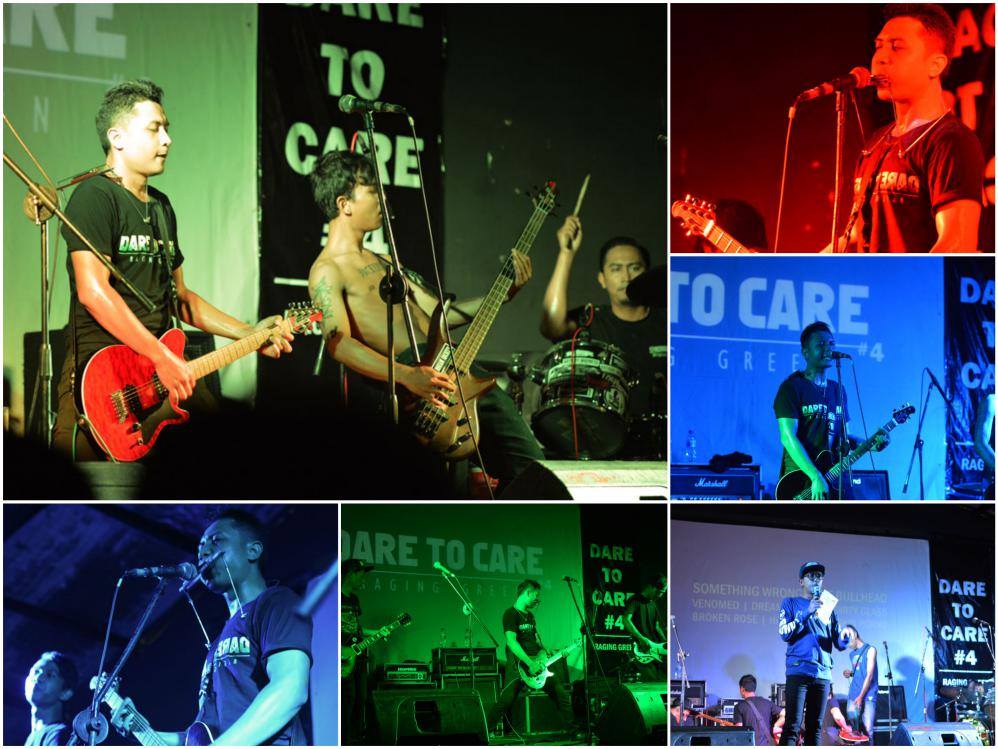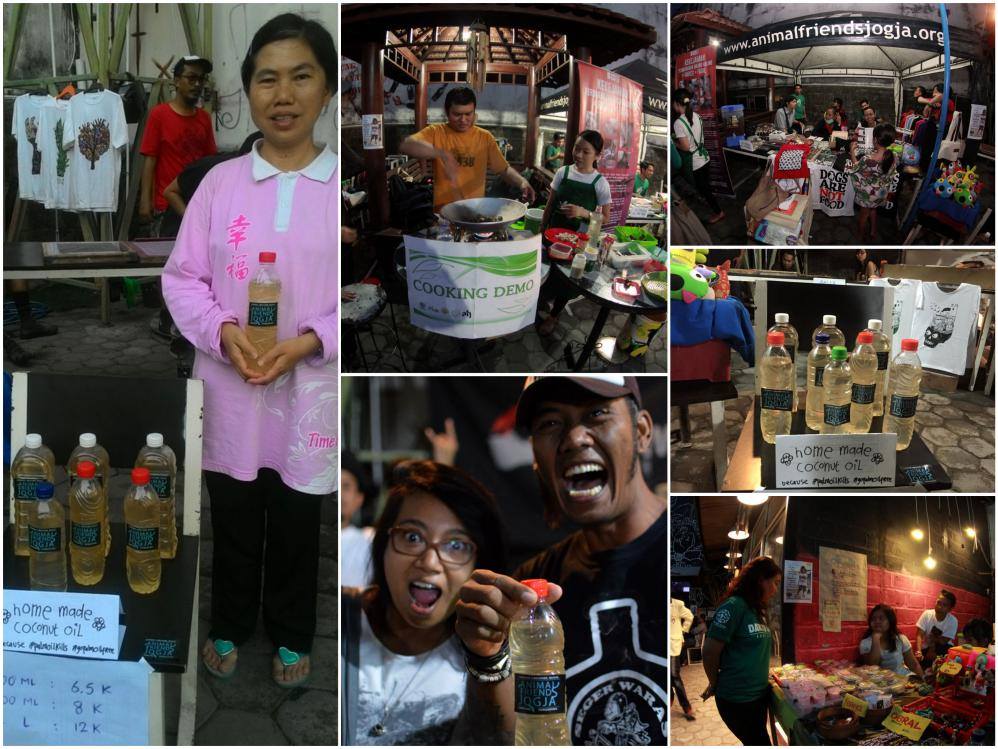Since 2001, Animal People has co-sponsored the Asia for Animals conference. This year, the AfA was held in Kuching, Malaysia from October 6-10 (learn more). During the two weeks beforehand, Animal People executive director Wolf Gordon Clifton traveled in Indonesia visiting different animal welfare-related projects. This series of articles, “Archipelago Animal Adventures,” is intended as a travelogue to document what he saw, for the benefit of activists in Indonesia and across the world striving to improve animal welfare in the archipelago.
Unless otherwise marked, all photos are free to use for non-commercial purposes, as specified under CC BY-NC 4.0.
Previous:
Winds of Change Along the Java Sea: Archipelago Animal Adventures, Days 1-2
Escape From Raptor Island: Archipelago Animal Adventures, Day 3
Night of the Fire Face: Archipelago Animal Adventures, Days 4-5
Day Six: Tuesday, September 29th
I woke up to the sound of birdsong, and warm sunlight streaming through my window slats. More distant were the muffled sounds of people talking as they washed their clothes in a nearby river. I rolled out of bed, opened my window, and breathed in the warm morning air.
I was in the city of Yogyakarta (pronounced “Jogjakarta”) in central Java, at a homestay called Omah Jegok. It was operated by Ina Pane, one of the cofounders of Animal Friends Jogja, who had generously offered to host me while I was in town. Normally she would rent the homestay out to wealthy foreign tourists, who provided a living income so she could afford to work full-time on behalf of animals.
- My bed at Omah Jegok
- The view from my window
- From the riverbank
- Homestay patio
- Little bar in the courtyard
- Open air kitchen
- Point taken!
- One of the homestay’s many art pieces
- One of Ina’s many friendly kitties!
I had arrived late the previous night, and stayed up much later yet talking and getting to know Ina. She told me she had grown up a city girl in Jakarta, isolated from the animals who provided her meat. It was only when she came to Yogyakarta for college that she first saw animals raised and slaughtered for food. She was so shocked that she immediately gave up eating meat – despite not even knowing the word “vegetarian,” let alone any other adherents. Ina’s father was initially so concerned that he called on a priest to meet with her, fearing she had been recruited into some sort of cult. Ina stuck to her resolve, however, eventually becoming fully vegan.
During college, Ina saw Femke den Haas, one of the co-founders of Jakarta Animal Aid Network, in a TV story about her animal rescue work. Femke’s example inspired Ina to co-found Animal Friends Jogja. Later on she got to meet Femke in person, thanks to a mutual contact (none other than Anita Mayangpuspa once again!). Animal Friends Jogja and JAAN are now partner organizations, working together closely to advance animal welfare in Indonesia.
Although I had missed Femke while in Jakarta, through blind luck of timing I was able to see her in Yogyakarta today! She had come to Jogja briefly to visit a JAAN site early that morning, and would be staying one night at Omah Jegok as well. Ina and I met her at the Animal Friends Jogja shelter a little after noon.
The shelter was only a few minutes’ walk from Omah Jegok, being located on the same property. Owned by a wealthy artist sympathetic to animals, the property was large and – ironically given its location in the suburbs of a large city – the most densely forested place I had yet seen in Indonesia this trip. In fact, the abundance of trees was so unusual as to be regarded with suspicion… some locals even refused to visit the property at night, fearing it was haunted by ghosts and demons!
- Forest! In Indonesia! It must be haunted…
- A new advertising agency under construction. The tenants have promised to respect the surrounding forest and animals.
- Construction site
- Construction site
- Animal Friends Jogja shelter
- Gate of the shelter
- Me, Ina, and Femke
- The shelter is lush with vegetation
- Ina and dog
- Shelter central. A traditional Javanese building, the door is low to force visitors to bow.
- Inside the building
- Pica the dog in kennel
- Pica
- Pica
- Pica
- Albus the three-legged dog
- Albus
- Albus
- A handicraft workshop adjoining the shelter
- Handicraft worker
- Decorative mirror made at the shop
- Kitty
- Ina and kitty
- Noisy little dog
- Treating a sick dog in quarantine
- Bandaging ear
- Bandaging ear
- Ready to heal!
- Rescued newborn kittens
- Newborn kittens
- Dog care schedule
- Animal Friends Jogja has made some powerful enemies, necessitating a security system with cameras
Regarding the security system, Ina explained that AFJ and JAAN’s campaigns had made them some powerful enemies. Among the most dangerous are Taman Safari, a chain of drive-thru safari parks with locations across Indonesia, and Wersut Seguni Indonesia, a Java-based zoo and marine park which operates traveling dolphin shows and rents dolphins out to resorts, particularly in Bali. AFJ and JAAN have been vocal in condemning both companies’ poor treatment of animals. Wersut Seguni has responded by sending thugs to both organizations’ sites to threaten and, in a few instances, even damage property and injure workers or volunteers.
The fact that Taman Safari and Wersut Seguni perceive the activists as such a serious threat is, in a way, a hopeful sign for the future. But the companies have deep pockets, and many politicians on their payrolls. The battle is thus likely to be a long one… though I for one am confident that with courage, strategy, and determination, Animal Friends Jogja and Jakarta Animal Aid Network can win!
Animal Friends Jogja is supported by a team of dedicated volunteers, many of them college students with strong creative and technical skills they contribute to campaigns.
- Volunteer-created poster for Animal Friends Jogja
- Anti-dogfighting poster
- Volunteer-created poster
- Volunteer Nomen bringing out the puppets used in AFJ’s shows for children
- Nomen, Ina, and puppets
- Nomen, Ina, and puppets
- The shop where the puppet-making materials come from, seen later that evening displaying an AFJ sign next to its own
- Inside the “Hey You Shop”
- Inside the shop
Nomen is in charge of AFJ’s puppet shows, used to teach schoolchildren about various topics in animal welfare and conservation. Current shows deal with the exploitation of dolphins in captivity and slaughter of sharks for their fins, while two more are in development to address dancing monkeys and the dog meat trade. AFJ has performed at a number of local schools, and the effects are already visible. Now children often bring animals abused by other members of their family to the shelter, and some parents are starting to improve their treatment of animals under pressure from their kids!
Overall, the Animal Friends shelter was clean and not overcrowded, much like the JAAN shelter in Jakarta. In fact, by comparison to most shelters around the world both facilities seemed underpopulated. Of course, street dogs are a lot less common in Jakarta and Yogyakarta than in most places, and as in most Muslim cultures, dogs haven’t been commonly kept as pets in Indonesia until recently. So from that perspective, it makes sense that the number of incoming animals would be more manageable than in other places.
However, Yogyakarta is also a hub of the dog meat trade. This is not, as I had initially assumed, simply because the region hosts a large Christian population (Christians, unlike Muslims, being free of dietary restrictions prohibiting dog meat). According to Ina, Muslims in Yogyakarta also eat dogs. For many, claims as to the health benefits of dog meat evidently hold greater weight than do the teachings of their religion.
A few of the dogs at Animal Friends had been rescued from the dog meat trade. These were rare cases, however. In some parts of Indonesia dogs are sold live in meat markets and slaughtered publicly, such as Sulawesi, where just days earlier footage of a dog being blowtorched alive triggered worldwide outrage. By contrast, in Yogyakarta only the final product is seen by consumers, after the dogs are slaughtered outside the city in secretive, mostly unknown locations. This makes it harder to combat by legal means or through direct action, but also more vulnerable to changes in consumer demand. Shielded from seeing the cruelty of slaughter, people in Yogyakarta are not desensitized to animal suffering as in Sulawesi – just ignorant, much as in the United States. Force them to confront where dog meat comes from, and they’re more likely to give it up.
This is where JAAN and AFJ’s joint campaign, Dogs Are Not Food, comes in. Dogs Are Not Food seeks to raise awareness of Indonesia’s dog meat trade, the cruelty involved, the health risks dog meat poses, and the industry’s role in spreading rabies.
Due to the latter especially, rabies now threatening much of Indonesia, the government has begun to take the issue of dog meat seriously. Their actions, however, can be difficult to interpret. That very day, while Ina, Femke, and I were at the shelter, Indonesian social media exploded over claims that Jakarta’s governor had proposed to legalize dog meat! When Femke told me this, I was immediately shocked. She kept her cool, however, and reasoned that what the governor had most likely actually proposed was a means of “regulating” the dog meat trade in Jakarta – knowing that dog meat trafficking as it currently exists could never meet regulatory standards, and so empowering the government to better crack down on traffickers.
Indeed, Femke’s hypothesis was confirmed several days later, in an article published in Kompas. “You think it’s easy to breed dogs [for eating]?” Governor Basuki Tjahaja Purnama said (as translated into English). “Get permission for it? … We have no right to prohibit people from eating dogs, but actually what I’m doing is inadvertently limiting the consumption of dogs.” Traders dealing in stolen animals, or dogs testing positive for rabies, could be raided and arrested.
Even so, the regulation approach to ending dog meat still seems to me like a risky gamble. Despite improvement under President Widodo’s regime, the Indonesian government remains highly corrupt, and legalizing dog meat under any conditions – even impossible-to-meet ones – seems like it could just as well provide easy cover for dog meat traffickers as motivate police to actually enforce the rules. If passed, time will tell what effect the governor’s proposal ends up having, for good or ill.
__
None of us had eaten all day, and by mid-afternoon we were all very hungry. Femke, Ina, and I went to Milas, a local vegetarian and organic restaurant, for a delicious and very filling late lunch.
- Entrance to Milas
- Ina and Femke with Dogs Are Not Food shirt
- Lunch spread
- Soup
- Tempeh burger with fries and spicy ketchup
- Salad
- Tempeh
- Vegetarian satay
- Animal Friends Jogja merchandise for sale at restaurant
The complete menu offers a wide range of dishes, both from within Indonesia and abroad, including Chinese, Italian, and American recipes. A few dishes do include dairy products and honey, but these are clearly marked and can mostly be eliminated upon request.
My favorite item, not pictured, was a heavenly smoothie-like drink made with banana, coconut milk, tamarind, and palm sugar. Without a doubt, it was one of the most deliciously refreshing beverages I’ve ever consumed. The use of palm sugar initially concerned me, considering palm oil plantations’ central role in deforestation and the massive fires currently devastating much of Indonesia, which have killed or displaced countless animals (many endangered), are choking out cities in toxic smoke, and release more CO2 into the atmosphere than the entire U.S. economy. Fortunately, palm sugar comes from a different species of plant than palm oil, so Milas customers can enjoy without guilt!
The evening was a mixture of work and play, as I alternated between managing the Forum (another selling point for Omah Jegok – it has good wifi!) and socializing with Femke, Ina, and Ina’s husband Bandizt. Bandizt is the bassist for a ska band called Shaggy Dog, named after the Walt Disney comedy. Ina was once a member of the band as well, but in her own words she was “too punk” for Shaggy Dog’s aesthetic, being more hardcore in her own musical tastes. Animal Friends Jogja and Shaggy Dog often collaborate on public outreach events, however, and Bandizt enjoys organizing punk and metal concerts even though he doesn’t play those genres himself.
- Bandizt playing guitar with kitty
- Ina and Bandizt, when I asked for a “romantic” pose…
- “Helmgang,” Ina, Bandizt, and Femke’s idea for a new band!
Animal Friends Jogja’s next musical event was coming right up, Dare to Care: Raging Green, a heavy metal concert and festival on October 16th to promote vegetarian and vegan eating!
Ina invited me to attend Raging Green, and I would have loved to accept her invitation had I not already registered for a conference back in the U.S. starting that day. I was pleased to see an organization in Indonesia seriously promoting meatless eating, and through such a creative and delightfully offbeat choice of medium as well! It very clearly reflected the personalities of its creators, and from what I heard afterward was a big success in attracting crowds and spreading the veg message!
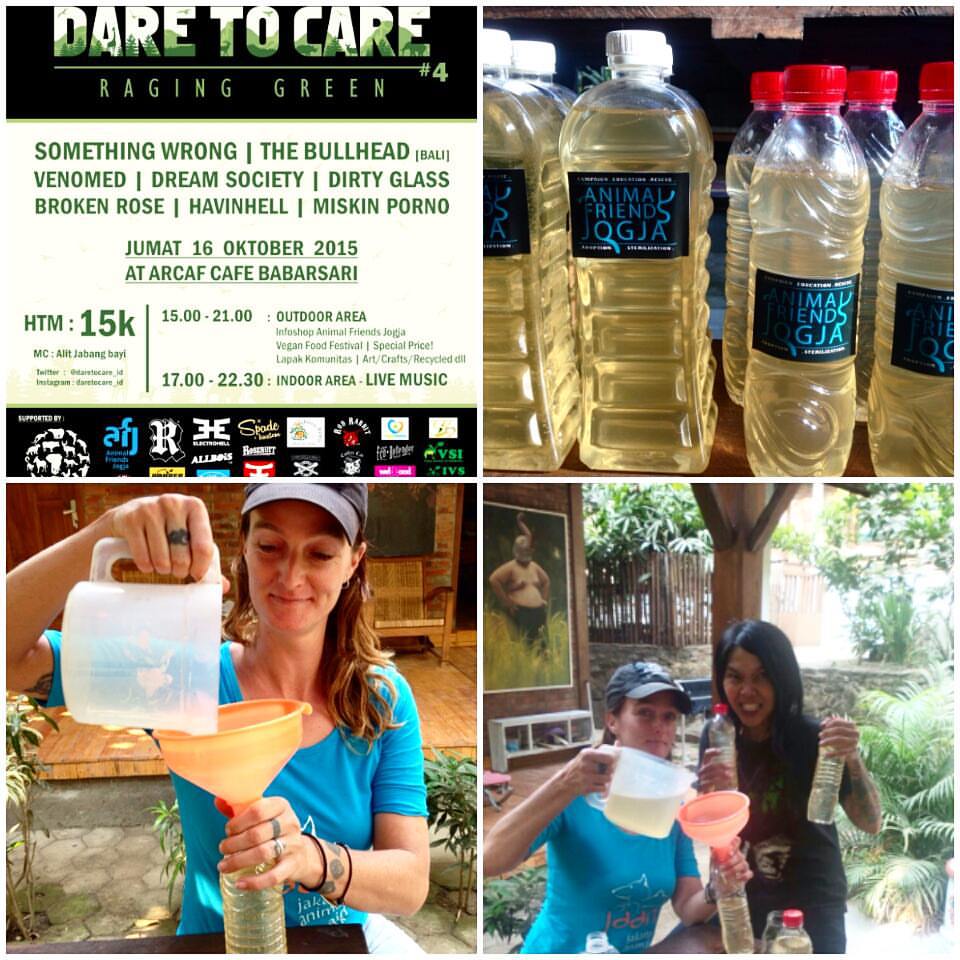
Ina and Femke bottling coconut oil to sell at Raging Green, as an alternative to palm oil. Courtesy Animal Friends Jogja, all rights reserved.
Seeing Ina and Femke together during my visit to AFJ, it was no wonder to me they had become such good friends and collaborators. They differed in disposition, Femke being chattier and more outgoing, while Ina was more introverted but with a fiery temper (by her own description – I saw no direct evidence of it during my stay). But in many core elements of their personality, they were like spiritual sisters. Both loved animals on a deeply emotional level, but were solidly intellectual as well, with rational, pragmatic approaches to their activism. Both also had a slightly rebellious, counterculture streak to them. At once incredibly passionate and playfully eccentric in the most positive way, I found the two of them very easy to befriend and fun to be around, and was grateful our paths had happened to converge in Yogyakarta today.
Continued in Beasts, Buddhas, & Vegan Punks of AFJ: Archipelago Animal Adventures, Days 7-8

